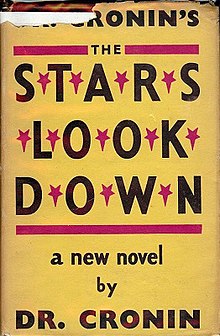
Busman's Honeymoon is a 1937 novel by Dorothy L. Sayers, her eleventh and last featuring Lord Peter Wimsey, and her fourth and last to feature Harriet Vane.
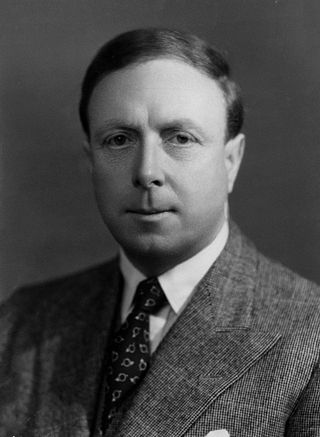
Archibald Joseph Cronin, known as A. J. Cronin, was a Scottish physician and novelist. His best-known novel is The Citadel (1937), about a Scottish physician who serves in a Welsh mining village before achieving success in London, where he becomes disillusioned about the venality and incompetence of some doctors. Cronin knew both areas, as a medical inspector of mines and as a physician in Harley Street. The book exposed unfairness and malpractice in British medicine and helped to inspire the National Health Service.

The National Coal Board (NCB) was the statutory corporation created to run the nationalised coal mining industry in the United Kingdom. Set up under the Coal Industry Nationalisation Act 1946, it took over the United Kingdom's collieries on "vesting day", 1 January 1947. In 1987, the NCB was renamed the British Coal Corporation, and its assets were subsequently privatised.

A pit village, colliery village or mining village is a settlement built by colliery owners to house their workers. The villages were built on the coalfields of Great Britain during the Industrial Revolution where new coal mines were developed in isolated or unpopulated areas. Such settlements were developed by companies for the incoming workers.
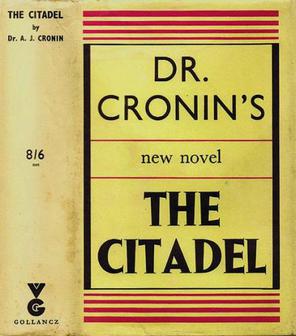
The Citadel is a novel by A. J. Cronin, first published in 1937, which was groundbreaking in its treatment of the contentious subject of medical ethics. It has been credited with laying the foundation in Britain for the introduction of the NHS a decade later.
The Miners' Federation of Great Britain (MFGB) was established after a meeting of local mining trade unions in Newport, Wales in 1888. The federation was formed to represent and co-ordinate the affairs of local and regional miners' unions in England, Scotland and Wales whose associations remained largely autonomous. At its peak, the federation represented nearly one million workers. It was reorganised into the National Union of Mineworkers in 1945.

The Citadel is a 1938 British drama film based on the 1937 novel of the same name by A. J. Cronin. The film was directed by King Vidor and produced by Victor Saville for Metro-Goldwyn-Mayer British at Denham Studios. It stars Robert Donat and Rosalind Russell. The film and book helped the creation of Britain's NHS in 1947.

How Green Was My Valley is a 1941 American drama film directed by John Ford, adapted by Philip Dunne from the 1939 novel of the same title by Richard Llewellyn. It stars Walter Pidgeon, Maureen O'Hara, Anna Lee, Donald Crisp, and a young Roddy McDowall.

Pittsburgh is a 1942 American drama film directed by Lewis Seiler and starring Marlene Dietrich, Randolph Scott, and John Wayne. Based on a story by George Owen and Tom Reed, the film is about an ambitious coal miner who values wealth and power in the Pittsburgh steel industry over his friends, lovers, and ideals, only to find himself deserted and alone at the top. When his fortune crumbles around him, he discovers that fate offers him an unexpected second chance. Filmed partially on location in Pittsburgh, Pennsylvania, the film co-stars Shemp Howard of Three Stooges fame in a rare dramatic role. Dietrich, Scott, and Wayne also made The Spoilers together that same year. Scott received top billing over Wayne in both films despite the fact that Wayne's roles were larger and more important.

Black Fury is a 1935 American crime film directed by Michael Curtiz, and starring Paul Muni, Karen Morley, and William Gargan. It was adapted by Abem Finkel and Carl Erickson from the short story "Jan Volkanik" by Judge Michael A. Musmanno, and the play Bohunk by Harry R. Irving. The plot is based on a historic incident during a Pennsylvania walk-out in 1929, in which John Barkowski, a striking coal miner, was beaten to death by private company police.
The South Yorkshire Coalfield is so named from its position within Yorkshire. It covers most of South Yorkshire, West Yorkshire and a small part of North Yorkshire. The exposed coalfield outcrops in the Pennine foothills and dips under Permian rocks in the east. Its most famous coal seam is the Barnsley Bed. Coal has been mined from shallow seams and outcrops since medieval times and possibly earlier.
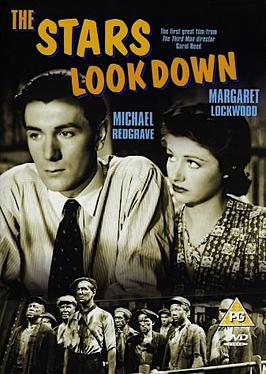
The Stars Look Down is a British film from 1940, based on A. J. Cronin's 1935 novel of the same title, about injustices in a mining town in North East England. The film, co-scripted by Cronin and directed by Carol Reed, stars Michael Redgrave as Davey Fenwick and Margaret Lockwood as Jenny Sunley. The film is a New York Times Critics' Pick and is listed in The New York Times Guide to the Best 1,000 Movies Ever Made.
The Stars Look Down is a 1975 British television adaptation written by Alan Plater from A. J. Cronin's 1935 novel The Stars Look Down. The Granada production was directed by Roland Joffé, Alan Grint and Howard Baker and starred Ian Hastings as David Fenwick and Susan Tracy as his wife, Jenny. Other versions include a 1940 British film and a 1971 Italian television adaptation.

E le stelle stanno a guardare is a 1971 Italian adaptation of A. J. Cronin's 1935 novel The Stars Look Down. It was written and directed by Anton Giulio Majano and was produced by Radiotelevisione Italiana. The miniseries was a massive success, averaging about 20 million viewers per episode.

Busman's Honeymoon is a 1940 British detective film directed by Arthur B. Woods. An adaptation of the 1937 Lord Peter Wimsey novel Busman's Honeymoon by Dorothy L. Sayers, Busman's Honeymoon stars Robert Montgomery, Constance Cummings, Leslie Banks, Googie Withers, Robert Newton and Seymour Hicks as Mervyn Bunter.
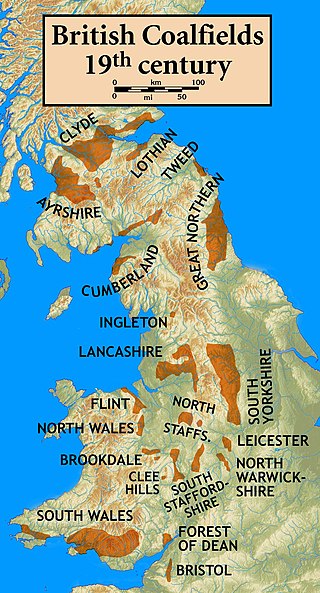
Coal mining in the United Kingdom dates back to Roman times and occurred in many different parts of the country. Britain's coalfields are associated with Northumberland and Durham, North and South Wales, Yorkshire, the Scottish Central Belt, Lancashire, Cumbria, the East and West Midlands and Kent. After 1972, coal mining quickly collapsed and had practically disappeared by the 21st century. The consumption of coal—mostly for electricity—fell from 157 million tonnes in 1970 to just 587,000 tonnes in 2023. Employment in coal mines fell from a peak of 1,191,000 in 1920 to 695,000 in 1956, 247,000 in 1976, 44,000 in 1993, 2,000 in 2015, and to 360 in 2022.

Blue Scar is a 1949 British drama film directed by documentary filmmaker Jill Craigie and starring Emrys Jones and Gwyneth Vaughn. Set in a Welsh village where the mine has recently been nationalised, it focuses on the relationship between Olwen Williams, a miner's daughter who leaves the village to live in London, and Tom Thomas, who dedicates his life to working in the mine. With Craigie's background in documentary films with a social message, Blue Scar was designed to raise questions about the value of nationalising the coal industry. It was the only non-documentary film Craigie directed.

The Coal Industry Commission Act 1919 was an Act of Parliament of the United Kingdom, which set up a commission, led by Mr Justice Sankey, to consider joint management or nationalisation of the coal mines. It also considered the issues of working conditions, wage and hours.
The Happy Lands is a 2012 British film written by Peter Cox and Robert Rae about a coal-mining community in Fife, Scotland, during the general strike of 1926. The film was released on 17 February 2012. Much of the film's dialogue is in the Scots language. Many of the cast members were amateurs who had no previous acting experience, and are relatives to the real-life miners involved in the historical strike.
